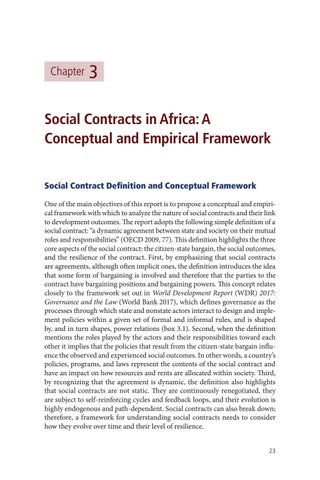Chapter
3
Social Contracts in Africa: A Conceptual and Empirical Framework Social Contract Definition and Conceptual Framework One of the main objectives of this report is to propose a conceptual and empirical framework with which to analyze the nature of social contracts and their link to development outcomes. The report adopts the following simple definition of a social contract: “a dynamic agreement between state and society on their mutual roles and responsibilities” (OECD 2009, 77). This definition highlights the three core aspects of the social contract: the citizen-state bargain, the social outcomes, and the resilience of the contract. First, by emphasizing that social contracts are agreements, although often implicit ones, the definition introduces the idea that some form of bargaining is involved and therefore that the parties to the contract have bargaining positions and bargaining powers. This concept relates closely to the framework set out in World Development Report (WDR) 2017: Governance and the Law (World Bank 2017), which defines governance as the processes through which state and nonstate actors interact to design and implement policies within a given set of formal and informal rules, and is shaped by, and in turn shapes, power relations (box 3.1). Second, when the definition mentions the roles played by the actors and their responsibilities toward each other it implies that the policies that result from the citizen-state bargain influence the observed and experienced social outcomes. In other words, a country’s policies, programs, and laws represent the contents of the social contract and have an impact on how resources and rents are allocated within society. Third, by recognizing that the agreement is dynamic, the definition also highlights that social contracts are not static. They are continuously renegotiated, they are subject to self-reinforcing cycles and feedback loops, and their evolution is highly endogenous and path-dependent. Social contracts can also break down; therefore, a framework for understanding social contracts needs to consider how they evolve over time and their level of resilience. 23

